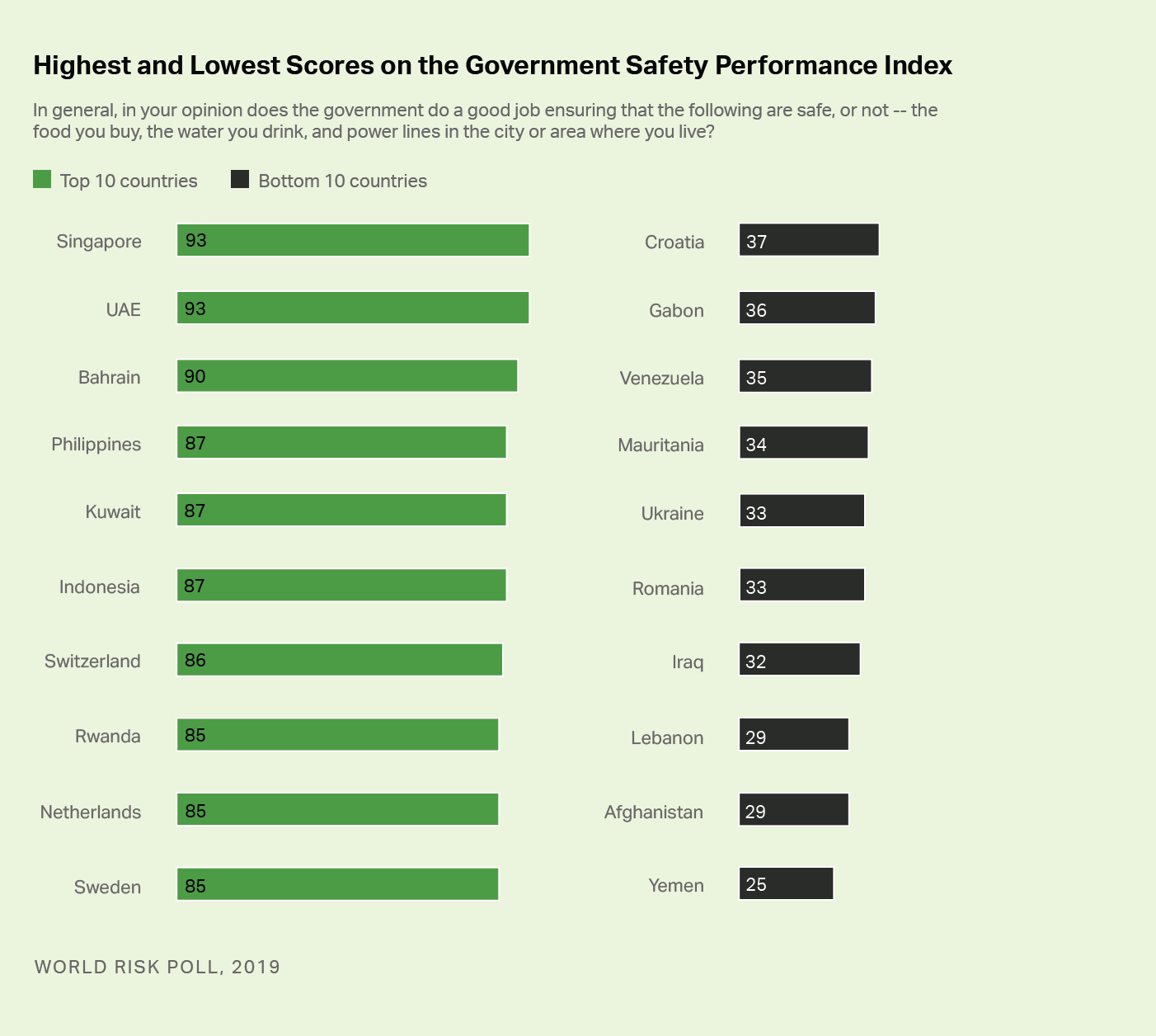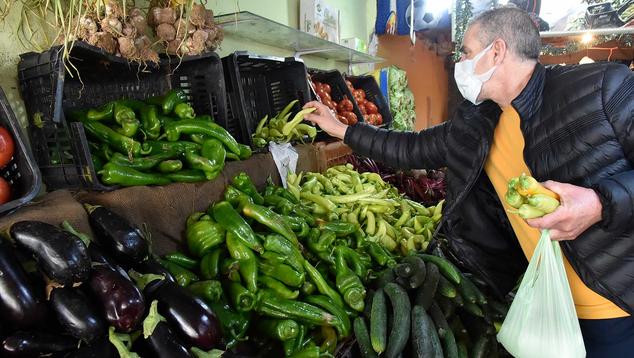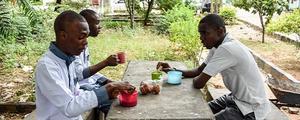A new global survey on risk shows some countries are succeeding -- while others are struggling -- to ensure the food their people buy, the water they drink and the power lines where they live are safe.
Across 140 countries surveyed in 2019, scores on the World Risk Poll Government Safety Performance Index (GSPI), a composite measure of how countries are performing in each of these areas, ranged from a high of 93 in Singapore and the United Arab Emirates to a low of 25 in Yemen. The higher the score on the index, the more people thought their respective governments were doing a good job in these three areas.

Bar chart. This chart shows the 10 countries with the highest and lowest scores on the Government Safety Performance Index in 2019. The higher the score on the index, the more people thought their respective governments were doing a good job of keeping food, water and power lines safe.
Scoring the Government Safety Performance Index (GSPI)
The GSPI uses a simple scoring system for each of the three items. For each question, people who said "yes" were coded 1; people who provided any other answer, including "no," "don't know" or "refused," were coded 0.
Question: In general, in your opinion does the government do a good job ensuring that the following are safe, or not?
A. The food you buy
B. The water you drink
C. Power lines in the city or area where you live
Individual results were averaged, summarized to the country level and multiplied by 100 to aid interpretation. A country's average score could range between 0 (no one said the government was doing a good job) and 100 (everybody believed the government was doing a good job).
The World Risk Poll, the first global study of worry and risk, provides insight into the biggest safety challenges people see facing them today, and how well their governments are fulfilling their mandate to keep people safe.
Singapore and the United Arab Emirates posted the highest GSPI scores in the world, each with a score of 93. Singapore frequently appears at the top of several Gallup World Poll indexes that capture the strength of the country's institutions. For example, Singapore has topped Gallup's Law and Order Index for the past five consecutive years.
Of the 10 countries that scored the lowest on the GSPI, EU member states Croatia and Romania performed poorly. People in both countries also lacked confidence in their government: Just 29% of Croatians and 16% of Romanians said they had confidence in their national government in 2019, according to the Gallup World Poll.
Economy, Politics and Culture Factor Into People's Confidence
The country in which people reside is a critical factor in understanding why people express different levels of confidence in their government's safety performance. Individual ratings of how well a government is functioning in safety-related issues are shaped, to some degree, by the economic, political or cultural context of the society in which they live.
People's feelings about their government's safety performance were also linked to broader feelings about their governing institutions. World Risk Poll results show that factors such as a country's overall economic wealth (GDP) partly shaped people's perceptions of how well their government was faring in keeping their food, water and power lines safe.
However, people's attitudes and personal backgrounds play an even larger role. The following factors were relevant in predicting how a person felt about their government's safety performance:
-
People who were concerned about the safety of their water -- more so than food or power lines -- gave their government lower-than-average safety performance ratings.
-
"Social trust" -- a measure of interpersonal and institutional trust based on three questions on the World Risk Poll -- was clearly linked with a country's GSPI performance. In general, countries with high levels of social trust also boasted high GSPI scores. This finding is in line with past research that shows social trust is a vital ingredient in building and maintaining a generally safe and secure society.
People who felt less financially secure also felt that their government was not doing a good job of keeping them safe. Worldwide, the average GSPI score among people who said they were "living comfortably" on their present household income was 75; this fell to 70 among those who said they were "getting by" on their present income and to 62 among those who said they were "finding it difficult" or "very difficult."
Implications
The Government Safety Performance Index is the first cross-country measure of how people rate their government's performance in ensuring the safety of three critical areas of life: food, water and power. It is widely recognized in the fields of political theory and international law that the ability to safely provide these types of essential provisions is one of the foremost obligations of any government; indeed, the United Nations considers access to safe water to be a universal human right.
As such, the GSPI is a barometer of how people assess their respective governments' ability to carry out these crucial responsibilities. The results suggest that, in many countries, people see room for improvement, particularly in the area of ensuring food safety. This is especially true in lower-income countries, which generally posted lower GSPI scores and where, according to other findings from the World Risk Poll, people are more likely to say they are very worried about experiencing serious harm from unsafe food or water in the near future.
Economic development, though, does not solely explain differences in how people (or countries) assess their government's safety performance. Social trust appears to matter too: Countries where social trust is high also tend to register higher GSPI scores than other areas. This finding may have particular resonance in the context of the ongoing COVID-19 pandemic, as some analysts have suggested that social trust may be an important factor in how successful a country is in handling the coronavirus.
Read more about this research in the World Risk Poll report.




